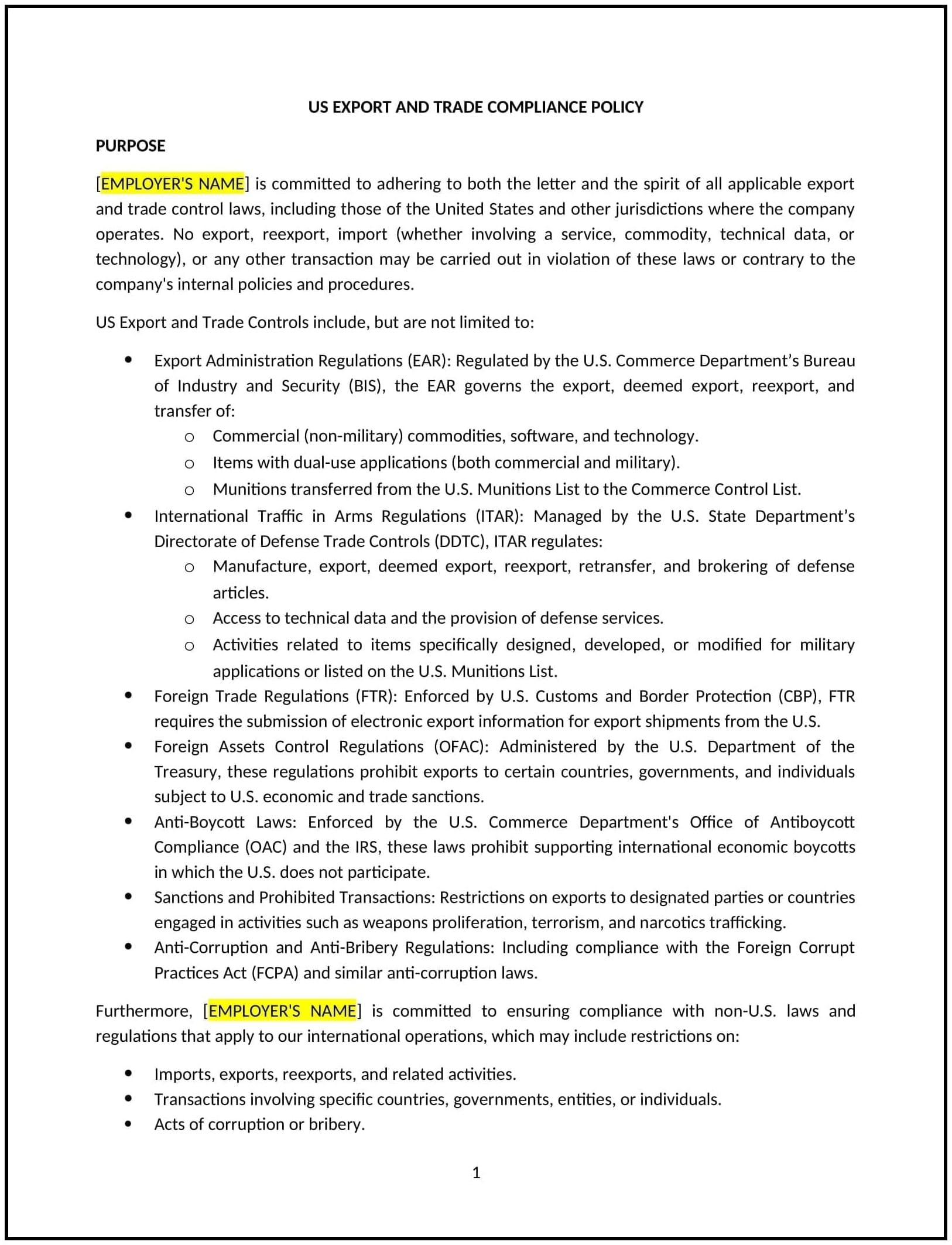US export and trade compliance policy (Nebraska): Free template
Got contracts to review? While you're here for policies, let Cobrief make contract review effortless—start your free review now.

Customize this template for free
US export and trade compliance policy (Nebraska)
A US export and trade compliance policy helps Nebraska businesses ensure that their operations align with federal regulations governing exports and international trade. This policy outlines the company’s commitment to following all applicable laws and regulations, including those related to the export of goods, services, technology, and intellectual property. It specifies the steps employees should take to ensure compliance with US export laws, including licensing requirements, restricted parties lists, and trade embargoes.
By adopting this policy, businesses in Nebraska can protect themselves from legal risks, avoid fines, and maintain ethical standards in their international dealings.
How to use this US export and trade compliance policy (Nebraska)
- Define applicable laws and regulations: Specify the key export laws and regulations that the business must adhere to, such as the Export Administration Regulations (EAR), International Traffic in Arms Regulations (ITAR), and the Office of Foreign Assets Control (OFAC) sanctions. Ensure employees are familiar with these laws and their implications.
- Outline the scope of compliance: Identify the types of exports that are covered by this policy, including physical goods, software, technology, and services. The policy should apply to all employees, contractors, and departments involved in international trade.
- Establish due diligence procedures: Employees should be instructed to conduct thorough due diligence to ensure that the company is not doing business with prohibited or restricted parties. The policy should include guidelines for checking potential customers, partners, or suppliers against restricted parties lists and embargoed countries.
- Set guidelines for export licensing: Specify the types of transactions that require export licenses, including those for controlled or sensitive items. Outline the process for obtaining the necessary licenses and approvals from the relevant government authorities before proceeding with exports.
- Provide training and awareness: Employees involved in international trade should receive regular training on export compliance, including how to identify red flags, handle sensitive information, and ensure adherence to export laws. This can help prevent inadvertent violations.
- Monitor and document compliance: Establish a system for tracking export transactions and maintaining records of compliance efforts. This should include keeping detailed documentation for export shipments, licenses, and any communications with regulatory authorities.
- Implement corrective actions and penalties: Outline the procedures for addressing any violations of export laws, including internal investigations and disciplinary actions. Specify the steps the company will take to correct any errors or omissions in compliance.
- Review and update: Regularly review and update the policy to reflect any changes in export regulations, trade agreements, or Nebraska state laws. Keeping the policy current will help the business stay in line with evolving legal requirements.
Benefits of using this US export and trade compliance policy (Nebraska)
This policy provides several benefits for Nebraska businesses:
- Reduces legal risk: By ensuring compliance with US export laws, businesses can minimize the risk of penalties, fines, and other legal consequences that could arise from non-compliance.
- Promotes ethical business practices: Adhering to trade compliance regulations demonstrates a commitment to ethical business practices and supports the company’s reputation as a responsible global entity.
- Improves operational efficiency: By establishing clear guidelines and processes for handling export compliance, businesses can streamline their operations and reduce the administrative burden of managing international trade.
- Protects national security: By following export control regulations, businesses help prevent sensitive technologies and products from falling into the wrong hands, contributing to national security.
- Supports global business relationships: Companies that demonstrate a commitment to compliance are more likely to build strong, trust-based relationships with international customers, partners, and suppliers.
Tips for using this US export and trade compliance policy (Nebraska)
- Communicate the policy clearly: Ensure that all employees involved in international trade are aware of the US export and trade compliance policy and understand its importance. The policy should be included in employee handbooks, onboarding materials, and internal communications.
- Train employees regularly: Provide ongoing training to employees involved in exporting goods, services, or technology to ensure they stay updated on changes to export laws and regulations. Training should cover topics such as restricted parties, licensing requirements, and reporting procedures.
- Conduct regular audits: Regularly audit export transactions and compliance processes to identify any potential violations or areas of improvement. Internal audits can help ensure that the company is consistently adhering to export laws.
- Document all compliance efforts: Keep detailed records of all export transactions, due diligence checks, licenses, and communications with regulatory bodies. This documentation can serve as evidence in the event of an audit or investigation.
- Stay informed about regulatory changes: Export laws and regulations may change over time, so it is essential to monitor updates from regulatory bodies such as the Bureau of Industry and Security (BIS) and OFAC. Adjust the policy as needed to stay in compliance with new requirements.